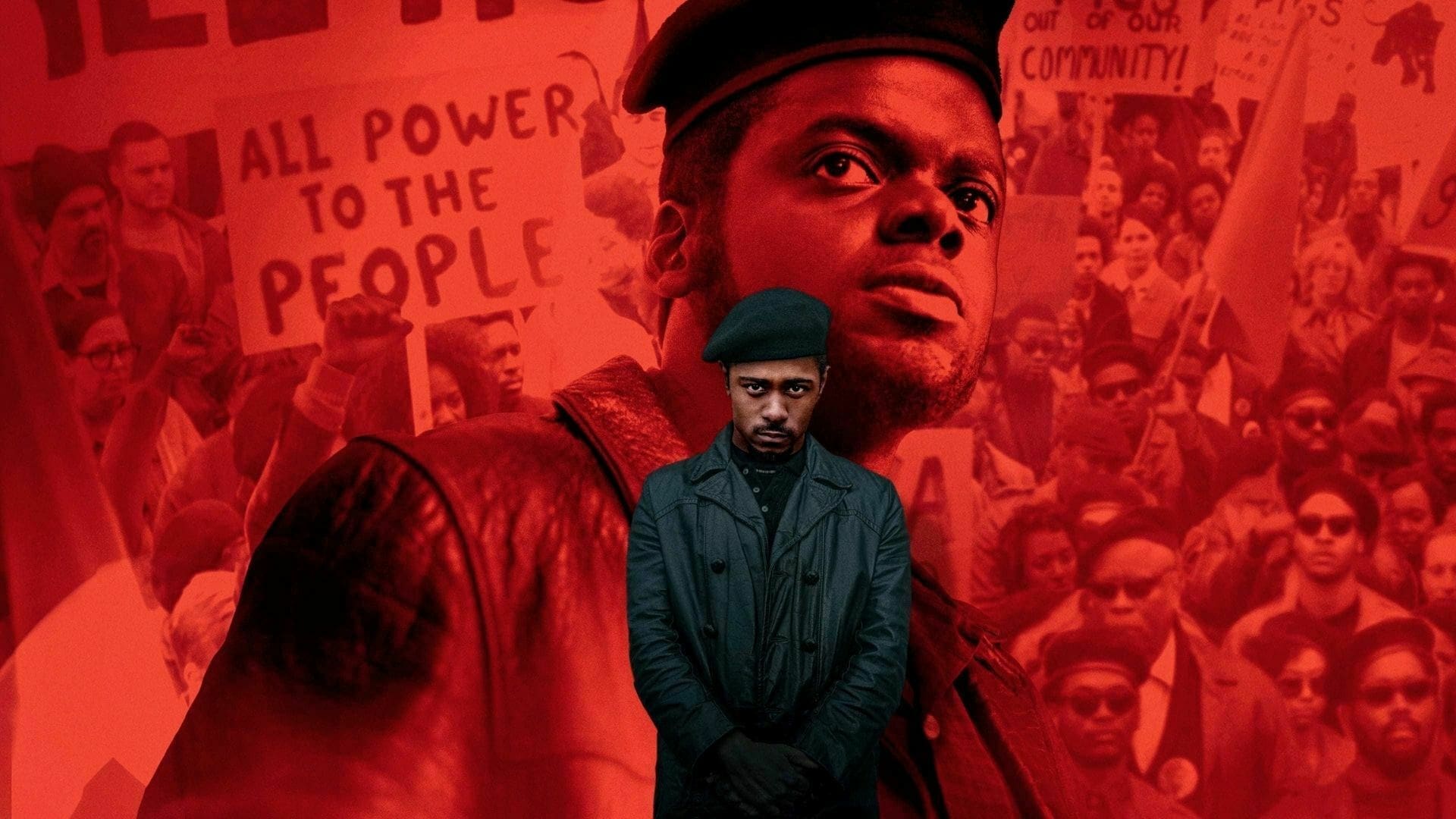
Judas and the Black Messiah – Walk the Traitor narrow
Polish your most menacing pool stick while we identify our biblical traitor, ya dig… in? This week we cover Shaka King’s Judas and the Black Messiah.
Hosted By
KT & Oti
For Your Reference
Show Notes
Polish your most menacing pool stick while we identify our biblical traitor, ya dig… in? This week we cover Shaka King’s Judas and the Black Messiah.
Patron shout out to Elaine from Angus Eye Tea!
Director: Shaka King
Writers: Will Berson (story by), Shaka King (story by)
Stars: Daniel Kaluuya, LaKeith Stanfield, Jesse Plemons
Breakdown and Analysis
- Self interest has brought revolutions down. Brilliant insight from Oti.
- Aside from the fact we are watching a film, the arts is a vessel to convey pain and challenge mainstream culture.
- Beautifully told story where we were taken through what the fight entailed. We knew what was coming but it did not hinder our enjoyment.
- It felt like a slow burn. In the sense that usually the subject matter can be a fiery portrayal. Between Hampton’s speeches there were lingering moments to reflect on preivous scenes and prepare for the next. Pacing akin to One Night in Miami. A lot is happening but not from what the audience might be expecting.
- Bill O’Neal is the protagonist. Surely we can’t cheer/boo a character without having context of Bill’s motivations?
- The film is book ended from talking heads of Lakeith as Bill and the real Bill at the end. He makes a comment where he saw something needed to be done. He did worse than those that did nothing. He purposefully undermined a revolution in front of his eyes.
- Roy’s comments about the Klan and Black Panthers being the same. It was a stark comparison. To notice that the system was built for you and the Panthers existed to bring that equality.
- The contrast between Fred and Bill is upsetting.
- You can’t pick and choose ideologies. The impassioned speeches of Fred fell upon traiterous ears. Because you can’t pick and choose the messages you want. There was a recurring throughout Fred’s dialogue that power is People. Reference back to Oti on it only taking one person for a revolution to fall. All of the feels and healing was for nought because he still went back and fed information. Especially as it appeared as though there was no conflict.
- When we’re talking about films that cover race and human rights, it is usually about Black America and White America. But in this instance, the betrayal was from one of their own people.
- Bill found opportunity when seeing the life Roy had. He became the Trojan horse and created chaos.
- Don’t think it would be too of authorities that they wouldn’t use someone to inflitrate the inner circle.
- The situation of going to jail for crimes Bill committed did not feel compelling enough for him to betray Fred and his people. We needed more context for Bill’s motivations against the cost of betrayal. Why doesn’t he care about black people?
- Asking Black people how they felt when Martin Luther King and Malcolm X became the litmus test.
- We had no choice but to not cheer for Bill. From a story point of view, Bill’s character was a bit lacking.
- Up until the tearful moment, there was no moment of inner conflict within Bill. He only got scared when he was worried he would get caught not because he saw the bigger picture.
- There was an interesting set up. We got straight to the dynamic between Bill and Fred. KT was hoping for some real tangible moments while Bill did what he did because he had to. Everything he did, reinforced his betrayal. There were no moments where he gave the Panthers a heads up.
- There is no way a war can be waged without at least political knowledge.
- For a system that exists to only benefit some while oppressing others it becomes deliberate at that point. The ones that are supposed to be learning these lessons are not listening, to this day.
- Hoover wanted Fred, dead, gone and forgotten in history.
- You can’t be afraid if you are fighting for radical change. Radical in the sense that everything needs to change.
- The evocation of Hampton’s words, by saying the nation is on fire and knowning exactly what he means. It was the pen he wielded and being a mouthpiece for the cause.
- The Rainbow Coalition was the OG Twitter.
- There was so much truth that was being spoken but the hurt was universal. Fred Hampton was the glue to uniting people.
- Oti lends an example in Kenya with Mau Mau fighters against the hands of Colonialism. KT adds how Tribalism is used against Rwandan people in the 1990s.
- We were expecting Jake’s mum to blame Fred but she understand her son and the cause they were fighting for. This example further frustrates how we felt about Bill.
- Judge, Judy & Executioner.
Unrelated but vital points
- Ashton Sanders is brilliant and deserves much more attention. Watch the Wu Tang Saga.
- Oti doesn’t give Widows the credit it is due (as in he liked it but not as much as KT).
- As per Oti, saying Black Messiah is redundant because Jesus was black. Free gratis, apparrently.
- Oti makes a ‘Bubs’ The Wire reference.
- KT makes an ‘Ashur’ Spartacus reference.
- Oti gives a sneak peek of his Bible lessons in the FYR cirriculum.
Referenced

KT's Picks
Referenced in this episode

One Night in Miami...
"Set on the night of February 25, 1964, "One Night in Miami" follows a young, brash Cassius Clay as he emerges from the Miami Beach Convention Center the new Heavyweight Boxing Champion of the World. Against all odds, he defeated Sonny Liston and shocked the sports world. While crowds of people swarm Miami Beach to celebrate the match, Clay - unable to stay on the island because of Jim Crow-era segregation laws - spends the evening at the Hampton House Motel in Miami's African American Overtown neighborhood celebrating with three of his closest friends: Malcolm X, Sam Cooke, and Jim Brown. During this historic evening, these icons, who each were the very representation of the Pre-Black Power Movement and felt the social pressure their cross-over celebrity brought, shared their thoughts with each other about their responsibilities as influencers, standing up, defending their rights and moving the country forward to equality and empowerment for all black people. The next morning, the four men emerge determined to define a new world for themselves and their community."

Oti's Picks
Referenced in this episode

Malcolm X
"Biograpical epic of Malcolm X, the legendary African American leader. Born Malcolm Little, his father (a Garveyite Baptist minister) was killed by the Ku Klux Klan. Malcolm became a gangster, and while in jail discovered the Nation of Islam writings of Elijah Muhammad. He preaches the teachings when let out of jail, but later on goes on a pilgrimage to the city of Mecca, there he converts to the original Islamic religion and becomes a Sunni Muslim and changes his name to El-Hajj Malik Al-Shabazz. He is assassinated on February 21, 1965 and dies a Muslim martyr."
Episode Details
- Duration
- 0:00
- Released
- March 3, 2021
- Category
- Episode
- Hosts


Up Next
We Need to Talk About Kevin – Deliver Us From Eva
February 10, 2026
Ratcatcher – What’s New Pussycat?
February 3, 2026
Marty Supreme, 28 Years Later: The Bone Temple, Night Patrol & My Brother’s Band
January 31, 2026